克林顿性丑闻女主角莱文斯基TED演讲稿:羞辱的代价
历史今天:1998年克林顿承认性臭闻(8.17)
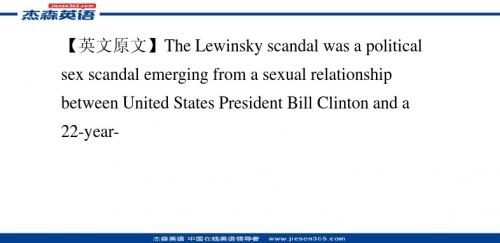
杰森英语,杰森英语官网,杰森英语怎么样
编辑:yingyu
g Clintons first term, and began a personal
relationship with him later that year. As Lewinskys
relationship with Clinton became more distant and she
left the White House to work at The Pentagon,
impeachment charges (of perjury and obstruction day Senate trial.In 1995, Monica
Lewinsky, a graduate of Lewis Clark College, was
hired to work as an intern at the White House durin
【英文原文】The Lewinsky scandal was a political
sex scandal emerging from a sexual relationship
between United States President Bill Clinton and a
22-year-
-old White House intern, Monica Lewinsky. The news
jury testimony Clinton was guarded, and argued, I
t depends on what the meaning of the word is is.【中
文译文】莱温斯基丑闻指的是美国总统比尔克林
心理辅导讲稿

第一章心理与世界什么是心理?什么是心理学?1、心理的误解心理的器官是大脑,而不是心脏,心脏是供血器官并非思维的器官。
2、心理学的误解学了心理学之后能知道别人心理想什么?是这样的吗?显然不是,心理学是研究心理现象及其规律的学科,不是“心里学”,是探索普遍规律的科学,并不是研究内心即时状态的神学。
那么心理学可不可以读懂人的内心呢?请看下面的案例。
案例:克林顿先生的“秘密”“I did not have sex relationship with that woman, Ms Lewinsky。
”克林顿公开发表讲话关于自己的性丑闻。
在被问及他与莱温斯基的婚外情时显得结结巴巴,而且神情也显得不那么自信,另外还频繁地触摸自己的鼻子。
克林顿:“I did not have sex relationship with that woman, Ms Lewinsky。
”(我并没有跟那个女人——莱温斯基小姐发生性关系。
)他并非用“didn’t”,而是用了“did not”,更在“Ms Lewinsky”用了“that woman”,是刻意地拉开距离。
有图片和视频资料显示,克林顿在说话时,手指的方向与眼神方向并不一致。
(心理现象的规律)心理学常识:皮诺曹效应,即撒谎时,鼻腔细胞组织就会充血而致搔痒,因为撒谎导致一种荷尔蒙激素的大量分泌,是它引起鼻腔内细胞组织的变化。
(心理现象的规律)3、心理现象心理现象:外界——感官——大脑——反应、感受、意识、性格等。
因被拍到视频,莱温斯基出来发声“是克林顿先生性搔扰”,全世界都在质疑克林顿,克林顿却说:“我跟她没有关系。
”幕僚建议公开声明没有发生关系。
克林顿的老婆也问:“真的没有吗?”“真没有!”发布会上,克林顿上演了一幕微表情的经典案例示范动作!全世界知道了克林顿说谎!4、心理过程:认知过程、情绪情感过程、意志过程这是什么颜色?(个别属性)指感觉;这是什么?(整体属性)知觉;这给人什么感觉?(体验与态度)指情绪情感。
莱温斯基TED2015演讲稿The price of shame.
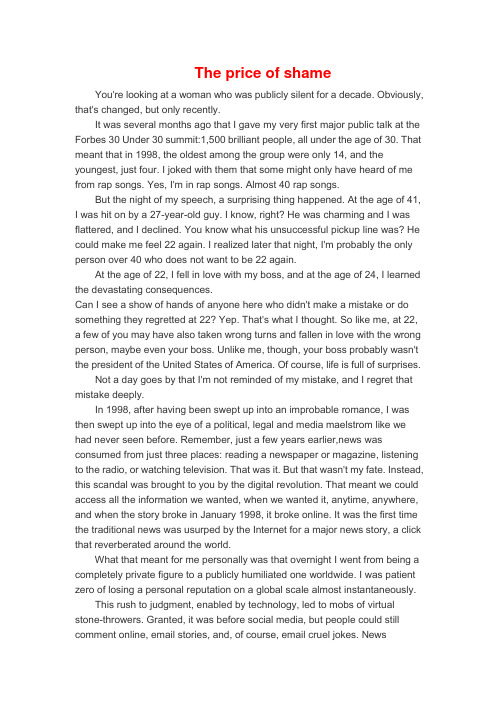
The price of shameYou're looking at a woman who was publicly silent for a decade. Obviously, that's changed, but only recently.It was several months ago that I gave my very first major public talk at the Forbes 30 Under 30 summit:1,500 brilliant people, all under the age of 30. That meant that in 1998, the oldest among the group were only 14, and the youngest, just four. I joked with them that some might only have heard of me from rap songs. Yes, I'm in rap songs. Almost 40 rap songs.But the night of my speech, a surprising thing happened. At the age of 41, I was hit on by a 27-year-old guy. I know, right? He was charming and I was flattered, and I declined. You know what his unsuccessful pickup line was? He could make me feel 22 again. I realized later that night, I'm probably the only person over 40 who does not want to be 22 again.At the age of 22, I fell in love with my boss, and at the age of 24, I learned the devastating consequences.Can I see a show of hands of anyone here who didn't make a mistake or do something they regretted at 22? Yep. That's what I thought. So like me, at 22, a few of you may have also taken wrong turns and fallen in love with the wrong person, maybe even your boss. Unlike me, though, your boss probably wasn't the president of the United States of America. Of course, life is full of surprises.Not a day goes by that I'm not reminded of my mistake, and I regret that mistake deeply.In 1998, after having been swept up into an improbable romance, I was then swept up into the eye of a political, legal and media maelstrom like we had never seen before. Remember, just a few years earlier,news was consumed from just three places: reading a newspaper or magazine, listening to the radio, or watching television. That was it. But that wasn't my fate. Instead, this scandal was brought to you by the digital revolution. That meant we could access all the information we wanted, when we wanted it, anytime, anywhere, and when the story broke in January 1998, it broke online. It was the first time the traditional news was usurped by the Internet for a major news story, a click that reverberated around the world.What that meant for me personally was that overnight I went from being a completely private figure to a publicly humiliated one worldwide. I was patient zero of losing a personal reputation on a global scale almost instantaneously.This rush to judgment, enabled by technology, led to mobs of virtual stone-throwers. Granted, it was before social media, but people could still comment online, email stories, and, of course, email cruel jokes. Newssources plastered photos of me all over to sell newspapers, banner ads online, and to keep people tuned to the TV. Do you recall a particular image of me, say, wearing a beret?Now, I admit I made mistakes, especially wearing that beret. But the attention and judgment that I received, not the story, but that I personally received, was unprecedented. I was branded as a tramp, tart, slut, whore, bimbo, and, of course, that woman. I was seen by many but actually known by few. And I get it: it was easy to forget that that woman was dimensional, had a soul, and was once unbroken.When this happened to me 17 years ago, there was no name for it. Now we call it cyberbullying and online harassment. Today, I want to share some of my experience with you, talk about how that experience has helped shape my cultural observations, and how I hope my past experience can lead to a change that results in less suffering for others.In 1998, I lost my reputation and my dignity. I lost almost everything, and I almost lost my life.Let me paint a picture for you. It is September of 1998. I'm sitting in a windowless office room inside the Office of the Independent Counsel underneath humming fluorescent lights. I'm listening to the sound of my voice, my voice on surreptitiously taped phone calls that a supposed friend had made the year before. I'm here because I've been legally required to personally authenticate all 20 hours of taped conversation. For the past eight months, the mysterious content of these tapes has hung like the Sword of Damocles over my head. I mean, who can remember what they said a year ago? Scared and mortified, I listen, listen as I prattle on about the flotsam and jetsam of the day; listen as I confess my love for the president, and, of course, my heartbreak; listen to my sometimes catty, sometimes churlish, sometimes silly self being cruel, unforgiving, uncouth; listen, deeply, deeply ashamed, to the worst version of myself,a self I don't even recognize.A few days later, the Starr Report is released to Congress, and all of those tapes and trans, those stolen words, form a part of it. That people can read the trans is horrific enough, but a few weeks later, the audio tapes are aired on TV, and significant portions made available online. The public humiliation was excruciating. Life was almost unbearable.This was not something that happened with regularity back then in 1998, and by this, I mean the stealing of people's private words, actions, conversations or photos, and then making them public -- public without consent, public without context, and public without compassion.Fast forward 12 years to 2010, and now social media has been born. The landscape has sadly become much more populated with instances like mine, whether or not someone actually make a mistake, and now it's for both public and private people. The consequences for some have become dire, very dire.I was on the phone with my mom in September of 2010, and we were talking about the news of a young college freshman from Rutgers University named Tyler Clementi. Sweet, sensitive, creative Tyler was secretly webcammed by his roommate while being intimate with another man. When the online world learned of this incident, the ridicule and cyberbullying ignited.A few days later, Tyler jumped from the George Washington Bridge to his death. He was 18.My mom was beside herself about what happened to Tyler and his family, and she was gutted with painin a way that I just couldn't quite understand, and then eventually I realized she was reliving 1998, reliving a time when she sat by my bed every night, reliving a time when she made me shower with the bathroom door open, and reliving a time when both of my parents feared that I would be humiliated to death,literally.Today, too many parents haven't had the chance to step in and rescue their loved ones. Too many have learned of their child's suffering and humiliation after it was too late. Tyler's tragic, senseless death was a turning point for me. It served to recontextualize my experiences, and I then began to look at the world of humiliation and bullying around me and see something different. In 1998, we had no way of knowing where this brave new technology called the Internet would take us. Since then, it has connected people in unimaginable ways, joining lost siblings, saving lives, launching revolutions, but the darkness, cyberbullying, and slut-shaming that I experienced had mushroomed. Every day online, people, especially young people who are not developmentally equipped to handle this, are so abused and humiliated that they can't imagine living to the next day, and some, tragically, don't, andthere's nothing virtual about that. ChildLine, a U.K. nonprofit that's focused on helping young people on various issues,released a staggering statistic late last year: From 2012 to 2013, there was an 87 percent increase in calls and emails related to cyberbullying. A meta-analysis done out of the Netherlands showed that for the first time, cyberbullying was leading to suicidal ideations more significantly than offline bullying. And you know what shocked me, although it shouldn't have, was other research last year that determined humiliation was a more intensely felt emotion than either happiness or even anger.Cruelty to others is nothing new, but online, technologically enhanced shaming isamplified, uncontained, and permanently accessible. The echo of embarrassment used to extend only as far as your family, village, school or community, but now it's the online community too. Millions of people, often anonymously, can stab you with their words, and that's a lot of pain, and there are no perimeters around how many people can publicly observe you and put you in a public stockade. There is a very personal price to public humiliation, and the growth of the Internet has jacked up that price.For nearly two decades now, we have slowly been sowing the seeds of shame and public humiliation in our cultural soil, both on- and offline. Gossip websites, paparazzi, reality programming, politics, news outlets and sometimes hackers all traffic in shame. It's led to desensitization and a permissive environment online which lends itself to trolling, invasion of privacy, and cyberbullying. This shift has created what Professor Nicolaus Mills calls a culture of humiliation. Consider a few prominent examples just from the past six months alone. Snapchat, the service which is used mainly by younger generationsand claims that its messages only have the lifespan of a few seconds. You can imagine the range of content that that gets. A third-party app which Snapchatters use to preserve the lifespan of the messages was hacked, and 100,000 personal conversations, photos, and videos were leaked online to now have a lifespan of forever. Jennifer Lawrence and several other actors had their iCloud accounts hacked, and private, intimate, nude photos were plastered across the Internet without their permission.One gossip website had over five million hits for this one story. And what about the Sony Pictures cyberhacking? The documents which received the most attention were private emails that had maximum public embarrassment value.But in this culture of humiliation, there is another kind of price tag attached to public shaming. The price does not measure the cost to the victim, which Tyler and too many others, notably women, minorities,and members of the LGBTQ community have paid, but the price measures the profit of those who prey on them. This invasion of others is a raw material, efficiently and ruthlessly mined, packaged and sold at a profit. A marketplace has emerged where public humiliation is a commodity and shame is an industry.How is the money made? Clicks. The more shame, the more clicks. The more clicks, the more advertising dollars. We're in a dangerous cycle. The more we click on this kind of gossip, the more numb we get to the human lives behind it, and the more numb we get, the more we click. All the while, someone is making money off of the back of someone else's suffering. With every click, we make a choice. The more we saturate our culture with public shaming, the more accepted it is,the more we will see behavior like cyberbullying, trolling, some forms of hacking, and online harassment. Why? Because they all have humiliation at their cores. This behavior is a symptom of the culture we've created. Just think about it.Changing behavior begins with evolving beliefs. We've seen that to be true with racism, homophobia, and plenty of other biases, today and in the past. As we've changed beliefs about same-sex marriage, more people have been offered equal freedoms. When we began valuing sustainability, more people began to recycle. So as far as our culture of humiliation goes, what we need is a cultural revolution. Public shaming as a blood sport has to stop, and it's time for an intervention on the Internet and in our culture.The shift begins with something simple, but it's not easy. We need to return to a long-held value of compassion -- compassion and empathy. Online, we've got a compassion deficit, an empathy crisis.Researcher Brené Brown said, and I quote, "Shame can't survive empathy." Shame cannot survive empathy. I've seen some very dark days in my life, and it was the compassion and empathy from my family, friends, professionals, and sometimes even strangers that saved me. Even empathy from one person can make a difference. The theory of minority influence, proposed by social psychologist Serge Moscovici, says that even in small numbers, when there's consistency over time, change can happen. In the online world, we can foster minority influence by becoming upstanders. To become an upstander means instead of bystander apathy, we can post a positive comment for someone or report a bullying situation. Trust me, compassionate comments help abate the negativity. We can also counteract the culture by supporting organizations that deal with these kinds of issues, like the Tyler Clementi Foundation in the U.S., In the U.K., there's Anti-Bullying Pro, and in Australia, there's Project Rockit.We talk a lot about our right to freedom of expression, but we need to talk more about our responsibility to freedom of expression. We all want to be heard, but let's acknowledge the difference between speaking up with intention and speaking up for attention. The Internet is the superhighway for the id, but online, showing empathy to others benefits us all and helps create a safer and better world. We need to communicate online with compassion, consume news with compassion, and click with compassion. Just imagine walking a mile in someone else's headline. I'd like to end on a personal note. In the past nine months, the question I've been asked the most is why. Why now? Why was I sticking my head above the parapet? You can read between the lines in thosequestions, and the answer has nothing to do with politics.The top note answer was and is because it's time: time to stop tip-toeing around my past; time to stop living a life of opprobrium; and time to take back my narrative. It's also not just about saving myself. Anyone who is suffering from shame and public humiliation needs to know one thing: You can survive it.I know it's hard. It may not be painless, quick or easy, but you can insist on a different ending to your story. Have compassion for yourself. We all deserve compassion, and to live both online and off in a more compassionate world.Thank you for listening.莫妮卡·莱温斯基主讲人:莫妮卡莱温斯基主题:耻辱的代价时间:2015年3月19日主办:Ted大会【编者按】17年前白宫性丑闻事件的当事人,前白宫实习生莫妮卡莱温斯基在沉默了十年之后,走上Ted大会的讲台,呼吁抵制网络欺凌。
莱温斯基:羞辱的代价
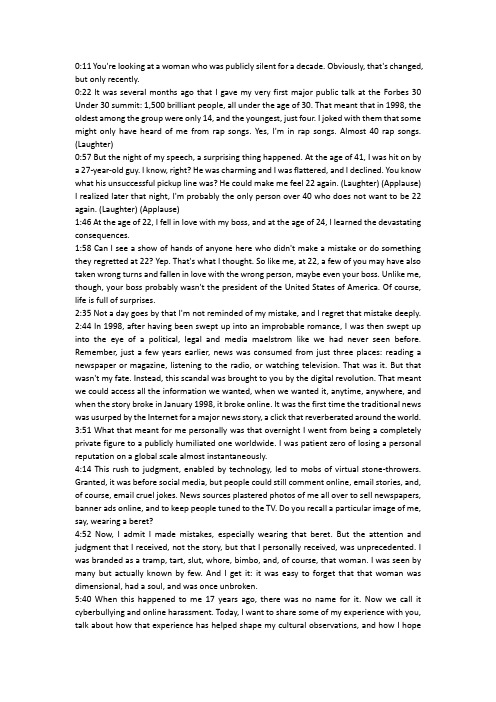
0:11 You're looking at a woman who was publicly silent for a decade. Obviously, that's changed, but only recently.0:22 It was several months ago that I gave my very first major public talk at the Forbes 30 Under 30 summit: 1,500 brilliant people, all under the age of 30. That meant that in 1998, the oldest among the group were only 14, and the youngest, just four. I joked with them that some might only have heard of me from rap songs. Yes, I'm in rap songs. Almost 40 rap songs. (Laughter)0:57 But the night of my speech, a surprising thing happened. At the age of 41, I was hit on by a 27-year-old guy. I know, right? He was charming and I was flattered, and I declined. You know what his unsuccessful pickup line was? He could make me feel 22 again. (Laughter) (Applause) I realized later that night, I'm probably the only person over 40 who does not want to be 22 again. (Laughter) (Applause)1:46 At the age of 22, I fell in love with my boss, and at the age of 24, I learned the devastating consequences.1:58 Can I see a show of hands of anyone here who didn't make a mistake or do something they regretted at 22? Yep. That's what I thought. So like me, at 22, a few of you may have also taken wrong turns and fallen in love with the wrong person, maybe even your boss. Unlike me, though, your boss probably wasn't the president of the United States of America. Of course, life is full of surprises.2:35 Not a day goes by that I'm not reminded of my mistake, and I regret that mistake deeply.2:44 In 1998, after having been swept up into an improbable romance, I was then swept up into the eye of a political, legal and media maelstrom like we had never seen before. Remember, just a few years earlier, news was consumed from just three places: reading a newspaper or magazine, listening to the radio, or watching television. That was it. But that wasn't my fate. Instead, this scandal was brought to you by the digital revolution. That meant we could access all the information we wanted, when we wanted it, anytime, anywhere, and when the story broke in January 1998, it broke online. It was the first time the traditional news was usurped by the Internet for a major news story, a click that reverberated around the world.3:51 What that meant for me personally was that overnight I went from being a completely private figure to a publicly humiliated one worldwide. I was patient zero of losing a personal reputation on a global scale almost instantaneously.4:14 This rush to judgment, enabled by technology, led to mobs of virtual stone-throwers. Granted, it was before social media, but people could still comment online, email stories, and, of course, email cruel jokes. News sources plastered photos of me all over to sell newspapers, banner ads online, and to keep people tuned to the TV. Do you recall a particular image of me, say, wearing a beret?4:52 Now, I admit I made mistakes, especially wearing that beret. But the attention and judgment that I received, not the story, but that I personally received, was unprecedented. I was branded as a tramp, tart, slut, whore, bimbo, and, of course, that woman. I was seen by many but actually known by few. And I get it: it was easy to forget that that woman was dimensional, had a soul, and was once unbroken.5:40 When this happened to me 17 years ago, there was no name for it. Now we call itcyberbullying and online harassment. Today, I want to share some of my experience with you, talk about how that experience has helped shape my cultural observations, and how I hope my past experience can lead to a change that results in less suffering for others.6:09 In 1998, I lost my reputation and my dignity. I lost almost everything, and I almost lost my life.6:23 Let me paint a picture for you. It is September of 1998. I'm sitting in a windowless office room inside the Office of the Independent Counsel underneath humming fluorescent lights. I'm listening to the sound of my voice, my voice on surreptitiously taped phone calls that a supposed friend had made the year before. I'm here because I've been legally required to personally authenticate all 20 hours of taped conversation. For the past eight months, the mysterious content of these tapes has hung like the Sword of Damocles over my head. I mean, who can remember what they said a year ago? Scared and mortified, I listen, listen as I prattle on about the flotsam and jetsam of the day; listen as I confess my love for the president, and, of course, my heartbreak; listen to my sometimes catty, sometimes churlish, sometimes silly self being cruel, unforgiving, uncouth; listen, deeply, deeply ashamed, to the worst version of myself, a self I don't even recognize.7:55 A few days later, the Starr Report is released to Congress, and all of those tapes and transcripts, those stolen words, form a part of it. That people can read the transcripts is horrific enough, but a few weeks later, the audio tapes are aired on TV, and significant portions made available online. The public humiliation was excruciating. Life was almost unbearable.8:31 This was not something that happened with regularity back then in 1998, and by this, I mean the stealing of people's private words, actions, conversations or photos, and then making them public -- public without consent, public without context, and public without compassion.8:57 Fast forward 12 years to 2010, and now social media has been born. The landscape has sadly become much more populated with instances like mine, whether or not someone actually make a mistake, and now it's for both public and private people. The consequences for some have become dire, very dire.9:24 I was on the phone with my mom in September of 2010, and we were talking about the news of a young college freshman from Rutgers University named Tyler Clementi. Sweet, sensitive, creative Tyler was secretly webcammed by his roommate while being intimate with another man. When the online world learned of this incident, the ridicule and cyberbullying ignited. A few days later, Tyler jumped from the George Washington Bridge to his death. He was 18.10:06 My mom was beside herself about what happened to Tyler and his family, and she was gutted with pain in a way that I just couldn't quite understand, and then eventually I realized she was reliving 1998, reliving a time when she sat by my bed every night, reliving a time when she made me shower with the bathroom door open, and reliving a time when both of my parents feared that I would be humiliated to death, literally.10:47 Today, too many parents haven't had the chance to step in and rescue their loved ones. Too many have learned of their child's suffering and humiliation after it was too late. Tyler's tragic, senseless death was a turning point for me. It served to recontextualize my experiences, and I then began to look at the world of humiliation and bullying around meand see something different. In 1998, we had no way of knowing where this brave new technology called the Internet would take us. Since then, it has connected people in unimaginable ways, joining lost siblings, saving lives, launching revolutions, but the darkness, cyberbullying, and slut-shaming that I experienced had mushroomed. Every day online, people, especially young people who are not developmentally equipped to handle this, are so abused and humiliated that they can't imagine living to the next day, and some, tragically, don't, and there's nothing virtual about that. ChildLine, a U.K. nonprofit that's focused on helping young people on various issues, released a staggering statistic late last year: From 2012 to 2013, there was an 87 percent increase in calls and emails related to cyberbullying. A meta-analysis done out of the Netherlands showed that for the first time, cyberbullying was leading to suicidal ideations more significantly than offline bullying. And you know what shocked me, although it shouldn't have, was other research last year that determined humiliation was a more intensely felt emotion than either happiness or even anger.12:55 Cruelty to others is nothing new, but online, technologically enhanced shaming is amplified, uncontained, and permanently accessible. The echo of embarrassment used to extend only as far as your family, village, school or community, but now it's the online community too. Millions of people, often anonymously, can stab you with their words, and that's a lot of pain, and there are no perimeters around how many people can publicly observe you and put you in a public stockade. There is a very personal price to public humiliation, and the growth of the Internet has jacked up that price.13:50 For nearly two decades now, we have slowly been sowing the seeds of shame and public humiliation in our cultural soil, both on- and offline. Gossip websites, paparazzi, reality programming, politics, news outlets and sometimes hackers all traffic in shame. It's led to desensitization and a permissive environment online which lends itself to trolling, invasion of privacy, and cyberbullying. This shift has created what Professor Nicolaus Mills calls a culture of humiliation. Consider a few prominent examples just from the past six months alone. Snapchat, the service which is used mainly by younger generations and claims that its messages only have the lifespan of a few seconds. You can imagine the range of content that that gets. A third-party app which Snapchatters use to preserve the lifespan of the messages was hacked, and 100,000 personal conversations, photos, and videos were leaked online to now have a lifespan of forever. Jennifer Lawrence and several other actors had their iCloud accounts hacked, and private, intimate, nude photos were plastered across the Internet without their permission. One gossip website had over five million hits for this one story. And what about the Sony Pictures cyberhacking? The documents which received the most attention were private emails that had maximum public embarrassment value.15:38 But in this culture of humiliation, there is another kind of price tag attached to public shaming. The price does not measure the cost to the victim, which Tyler and too many others, notably women, minorities, and members of the LGBTQ community have paid, but the price measures the profit of those who prey on them. This invasion of others is a raw material, efficiently and ruthlessly mined, packaged and sold at a profit. A marketplace has emerged where public humiliation is a commodity and shame is an industry. How is the money made? Clicks. The more shame, the more clicks. The more clicks, the more advertising dollars. We're in a dangerous cycle. The more we click on this kind of gossip, the more numb we get to the human lives behind it, and the more numb we get, the more weclick. All the while, someone is making money off of the back of someone else's suffering. With every click, we make a choice. The more we saturate our culture with public shaming, the more accepted it is, the more we will see behavior like cyberbullying, trolling, some forms of hacking, and online harassment. Why? Because they all have humiliation at their cores. This behavior is a symptom of the culture we've created. Just think about it.17:30 Changing behavior begins with evolving beliefs. We've seen that to be true with racism, homophobia, and plenty of other biases, today and in the past. As we've changed beliefs about same-sex marriage, more people have been offered equal freedoms. When we began valuing sustainability, more people began to recycle. So as far as our culture of humiliation goes, what we need is a cultural revolution. Public shaming as a blood sport has to stop, and it's time for an intervention on the Internet and in our culture.18:10 The shift begins with something simple, but it's not easy. We need to return to a long-held value of compassion -- compassion and empathy. Online, we've got a compassion deficit, an empathy crisis.18:28 Researcher Brené Brown said, and I quote, "Shame can't survive empathy." Shame cannot survive empathy. I've seen some very dark days in my life, and it was the compassion and empathy from my family, friends, professionals, and sometimes even strangers that saved me. Even empathy from one person can make a difference. The theory of minority influence, proposed by social psychologist Serge Moscovici, says that even in small numbers, when there's consistency over time, change can happen. In the online world, we can foster minority influence by becoming upstanders. To become an upstander means instead of bystander apathy, we can post a positive comment for someone or report a bullying situation. Trust me, compassionate comments help abate the negativity. We can also counteract the culture by supporting organizations that deal with these kinds of issues, like the Tyler Clementi Foundation in the U.S., In the U.K., there's Anti-Bullying Pro, and in Australia, there's Project Rockit.19:51 We talk a lot about our right to freedom of expression, but we need to talk more about our responsibility to freedom of expression. We all want to be heard, but let's acknowledge the difference between speaking up with intention and speaking up for attention. The Internet is the superhighway for the id, but online, showing empathy to others benefits us all and helps create a safer and better world. We need to communicate online with compassion, consume news with compassion, and click with compassion. Just imagine walking a mile in someone else's headline. I'd like to end on a personal note. In the past nine months, the question I've been asked the most is why. Why now? Why was I sticking my head above the parapet? You can read between the lines in those questions, and the answer has nothing to do with politics. The top note answer was and is because it's time: time to stop tip-toeing around my past; time to stop living a life of opprobrium; and time to take back my narrative. 21:17 It's also not just about saving myself. Anyone who is suffering from shame and public humiliation needs to know one thing: You can survive it. I know it's hard. It may not be painless, quick or easy, but you can insist on a different ending to your story. Have compassion for yourself. We all deserve compassion, and to live both online and off in a more compassionate world.21:54 Thank you for listening.21:57 (Applause)。
莱温斯基ted演讲稿 中英文

莱温斯基ted演讲稿中英文以下是聘才小编为大家搜索整理的,欢迎大家阅读。
莱温斯基ted演讲稿中英文站在你们面前的这个女性曾在公众面前沉默了十年。
显然,现在不一样了,不过这只是最近的事。
几个月前在福布斯”30位30岁以下创业者”峰会上,我首次公开发表演讲,峰会上有1500位杰出人士,全部不到30岁。
这就意味着在1998年,其中最年长的人也只有14岁,最年轻的则只有4岁。
我同他们开玩笑,有些人似乎只是从说唱音乐中听过我的名字。
没错,说唱音乐唱过我,几乎有40首这样的说唱音乐。
在我演讲当晚意外的事情发生了,作为一个41岁的女性,竟然有一个27岁的小伙子勾搭我。
我知道,难以相信吧?他很有魅力,说了不少奉承的话,结果我拒绝了。
知道他的搭讪不成功在哪吗?他说他能让我感到又回到了22岁……那天晚上我意识到,40岁时不想回到22岁的人或许就只有我了。
22岁时,我爱上了我的老板,在24岁那年,我明白了其毁灭性的后果。
能否请大家举手告诉我,如果你觉得自己22岁时没有犯过错,没有做过让自己后悔的事,请举手?同我想的一样,和我一样,22岁那年,你们中的一些人大概也犯过错,爱上过错误的人,或许也正是你的老板。
不过和我不同,你的老板八成不是美国总统。
当然,生活充满了意外。
每一天我都被提醒这个错误,我每天都在深深后悔。
1998年在卷入一段不可能的爱情之后,我被卷入政治、法律和媒体的漩涡中心,一场前所未见的漩涡。
记得吧,就在几年前,新闻只有三个来源:读报刊杂志、听收音机和看电视,就这些了。
但我的命并没这么好,这起丑闻通过数字革命被公之于众。
数字革命意味着我们能获取所有想要的信息,不管何时何地。
丑闻在1998年1月被首次揭露就是通过互联网。
这是传统媒体第一次在重大事件报道上被因特网抢先,一个点击的声音响彻了全世界。
对我个人而言,它让我一夜间从一个完完全全的无名人士变成一个被全世界公开羞辱的对象。
我成了零号病人,第一个经历如何在全球范围内瞬间失去个人声誉。
莫妮卡。莱温斯基——耻辱的代价(汉语英语对照文本)
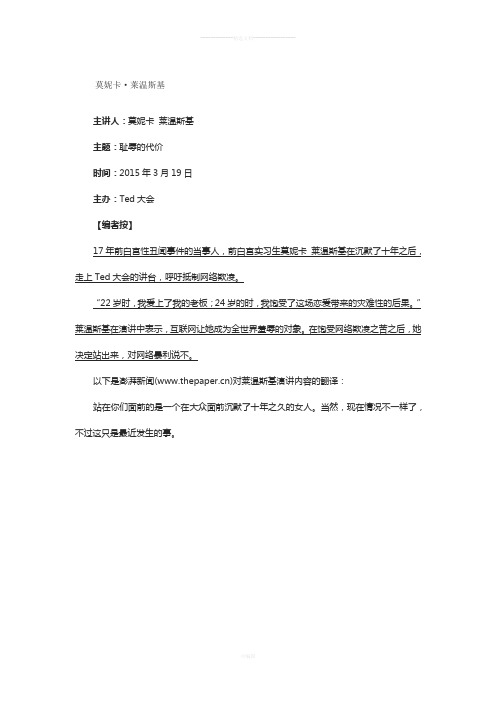
莫妮卡·莱温斯基主讲人:莫妮卡莱温斯基主题:耻辱的代价时间:2015年3月19日主办:Ted大会【编者按】以下是澎湃新闻()对莱温斯基演讲内容的翻译:站在你们面前的是一个在大众面前沉默了十年之久的女人。
当然,现在情况不一样了,不过这只是最近发生的事。
莱温斯基参加一次演讲。
网络图片不想回到22岁几个月前,我在《福布斯》杂志举办的“30岁以下”峰会(Under 30 Summit)上发表了首次公开演讲。
现场1500位才华横溢的与会者都不到30岁。
这意味着1998年,他们中最年长的是14岁,而最年轻的只有4岁。
我跟他们开玩笑道,他们中有些人可能只在说唱歌曲里听到过我的名字。
是的,大约有40首说唱歌曲唱过我。
但是,在我演讲当晚,发生了一件令人吃惊的事——我作为一个41岁的女人,被一个27岁的男孩示爱。
我知道,这听上去不太可能对吧?他很迷人,说了很多恭维我的话,然后我拒绝了他。
你知道他为何搭讪失败吗?他说,他可以让我感到又回到了22岁。
后来,那晚我意识到,也许我是年过40岁的女人中唯一一个不想重返22岁的人。
22岁时,我爱上了我的老板;24岁的时,我饱受了这场恋爱带来的灾难性的后果。
现场的观众们,如果你们在22岁的时候没有犯过错,或者没有做过让自己后悔的事,请举起手好吗?是的,和我想的一样。
与我一样,22岁时,你们中有一些人也曾走过弯路,爱上了不该爱的人,也许是你们的老板。
但与我不同的是,你们的老板可能不会是美国总统。
当然,人生充满惊奇。
之后的每一天,我都会想起自己所犯的错误,并为之深深感到后悔。
饱受网络欺凌之苦1998年,在卷入一场不可思议的恋情后,我又被卷入了一场前所未有的政治、法律和舆论漩涡的中心。
记得吗?几年前,新闻一般通过三个途径传播:读报纸杂志、听广播、和看电视,仅此而已。
但我的命运并不是仅此而已。
这桩丑闻是通过数字革命传播的。
这意味着我们可以获取任何我们需要的信息,不论何时何地。
这则新闻在1998年1月爆发时,它也在互联网上火了。
网络时代的背叛冷漠与同情
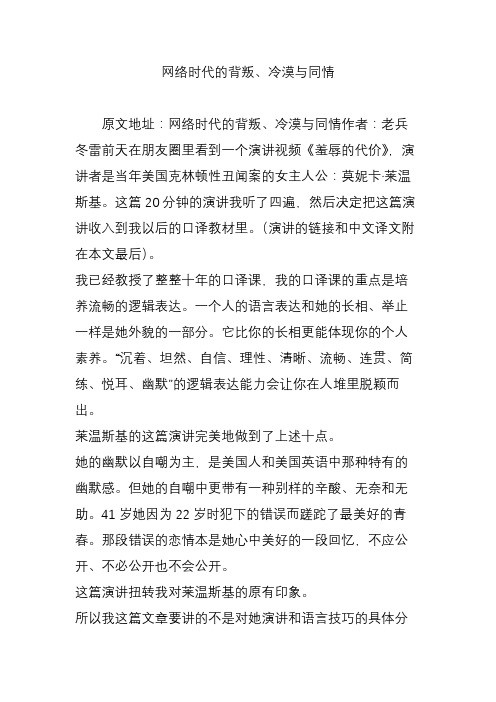
网络时代的背叛、冷漠与同情原文地址:网络时代的背叛、冷漠与同情作者:老兵冬雷前天在朋友圈里看到一个演讲视频《羞辱的代价》,演讲者是当年美国克林顿性丑闻案的女主人公:莫妮卡·莱温斯基。
这篇20分钟的演讲我听了四遍,然后决定把这篇演讲收入到我以后的口译教材里。
(演讲的链接和中文译文附在本文最后)。
我已经教授了整整十年的口译课,我的口译课的重点是培养流畅的逻辑表达。
一个人的语言表达和她的长相、举止一样是她外貌的一部分。
它比你的长相更能体现你的个人素养。
“沉着、坦然、自信、理性、清晰、流畅、连贯、简练、悦耳、幽默”的逻辑表达能力会让你在人堆里脱颖而出。
莱温斯基的这篇演讲完美地做到了上述十点。
她的幽默以自嘲为主,是美国人和美国英语中那种特有的幽默感。
但她的自嘲中更带有一种别样的辛酸、无奈和无助。
41岁她因为22岁时犯下的错误而蹉跎了最美好的青春。
那段错误的恋情本是她心中美好的一段回忆,不应公开、不必公开也不会公开。
这篇演讲扭转我对莱温斯基的原有印象。
所以我这篇文章要讲的不是对她演讲和语言技巧的具体分析,而它引发我思考的三个主题:背叛、冷漠、同情,我们在网络时代该如何面对这个世界。
一、背叛在莱温斯基看来,她爱上克林顿并发生性爱是一段浪漫故事。
她曾经描述过克林顿身上散发的那种强烈吸引力,所以她心甘情愿地成为他的秘密情人或者说性伴侣,因为他们之间的情感付出并不对等。
这一段恋情不正常,因为她是违反道德的。
这段恋情也正常,因为它不过是人的本性或本能。
但它完全是个人隐私,如果不被曝光也不会对任何别的人造成任何伤害。
这是一段让莱温斯基非常得意的恋情,毕竟她和美国总统有过一段恋情和性史。
得意忘形的她在与闺蜜的电话中把毫不掩饰地详细谈到了这段恋情,也谈到了她与克林顿的性爱。
年青、虚荣、轻狂、轻信的莱温斯基为此付出了惨痛的代价。
因为她无话不说的闺蜜把她的电话聊天进行了录音,录音总时间居然长达20个小时。
恐怖吗?你能想象你最好的朋友会把你告诉她的最私密的话进行录音吗?这太恐怖了。
莱温斯基 演讲

- 1、下载文档前请自行甄别文档内容的完整性,平台不提供额外的编辑、内容补充、找答案等附加服务。
- 2、"仅部分预览"的文档,不可在线预览部分如存在完整性等问题,可反馈申请退款(可完整预览的文档不适用该条件!)。
- 3、如文档侵犯您的权益,请联系客服反馈,我们会尽快为您处理(人工客服工作时间:9:00-18:30)。
克林顿性丑闻女主角莱文斯基TED演讲稿:羞辱的代价
克林顿性丑闻女主角莱文斯基2015年ted演讲稿:羞辱的代价。
莫尼卡.萨米勒.莱文斯基是美国前总统克林顿绯闻女友、”拉链门”女主角,性丑闻事件让莱温斯基声誉严重受损,隐匿多年后,2015年她再次高调出场,对网络给她带来的伤害发出了愤怒的控诉。
克林顿性丑闻女主角莱文斯基ted演讲稿:羞辱的代价
羞辱的代价
--克林顿性丑闻女主角莱文斯基2015年ted演讲稿
站在你们面前的这个女性曾在公众面前沉默了十年。
显然,现在不一样了,不过这只是最近的事。
几个月前在福布斯”30位30岁以下创业者”峰会上,我首次公开发表演讲,峰会上有1500位杰出人士,全部不到30岁。
这就意味着在1998年,其中最年长的人也只有14岁,最年轻的则只有4岁。
我同他们开玩笑,有些人似乎只是从说唱音乐中听过我的名字。
没错,说唱音乐唱过我,几乎有40首这样的说唱音乐。
在我演讲当晚意外的事情发生了,作为一个41岁的女性,竟然有一个27岁的小伙子勾搭我。
我知道,难以相信吧?他很有魅力,说了不少奉承的话,结果我拒绝了。
知道他的搭讪不成功在哪吗?他说他能让我感到又回到了22岁......那天晚上我意识到,40岁时不想回到22岁的人或许就只有我了。
22岁时,我爱上了我的老板,在24岁那年,我明白了其毁灭性的后果。
能否请大家举手告诉我,如果你觉得自己22岁时没有犯过错,没有做过让自己后悔的事,请举手?同我想的一样,和我一样,22岁那年,你们中的一些人大概也犯过错,爱上过错误的人,或许也正是你的老板。
不过和我不同,你的老板八成不是美国总统。
当然,生活充满了意外。
每一天我都被提醒这个错误,我每天都在深深后悔。
1998年在卷入一段不可能的爱情之后,我被卷入政治、法律和媒体的漩涡中心,一场前所未见的漩涡。
记得吧,就在几年前,新闻只有三个来源:读报刊杂志、听收音机和看电视,就这些了。
但我的命并没这么好,这起丑闻通过数字革命被公之于众。
数字革命意味着我们能获取所有想要的信息,不管何时何地。
丑闻在1998年1月被首次揭露就是通过互联网。
这是传统媒体第一次在重大事件报道上被因特网抢先,一个点击的声音响彻了全世界。
对我个人而言,它让我一夜间从一个完完全全的无名人士变成一个被全世界公开羞辱的对象。
我成了零号病人,第一个经历如何在全球范围内瞬间失去个人声誉。
这种由科技促进的草率道德审判导致我在网络世界里被投石暴民围攻。
诚然,这是在社交媒体出现之前,不过人们还是可以在线评论,邮件转发故事,当然,也能转发残忍的笑话。
新闻媒体将我的照片贴得到处都是,借此销售报纸,为网站吸引广告商,为电视吸引眼球。
记得我那张照片吗?戴着贝雷帽的那张?我承认,我犯了错误,特别是不该戴那顶贝雷帽。
在关注故事之外,人们对我个人的关注和道德审判也是前所未有的,我被打上各种标签荡妇、妓女、母狗、婊子、贱人,当然还有“那个女人”。
很多人都看到了我,但很少有人
了解我。
我明白,人们很容易忘记一个女人是多维度的,其实她也有灵魂,也曾是完好无缺的。
17年前,这些发生在我身上的事还没有专门的名词来称呼。
现在,我们称之为网络欺凌和线上骚扰。
今天,我想和大家分享一些个人经历,我要讲讲这些经历如何塑造了我的文化观察。
我希望我过去的经历,能够引起变革,让其他人少遭遇欺凌。
1998年我失去了声誉和尊严,我几乎失去了一切,包括生命。
让我给大家描绘一下,这是1998年9月,我坐在一间没有窗户的办公室,在独立检察官办公室,嗡嗡作响的荧光灯下,我听着自己的声音,这是一年前电话窃听录取的声音,这位录音者,我原来还当作朋友。
我坐在那里是因为法律要求,我要亲自鉴定全部二十小时的对话录音。
过去的八个月,这些录音带中的神秘内容,就像达摩克利斯之剑一样悬在我的头顶。
想想,谁能记得自己一年前说了什么。
我很害怕,很屈辱地听着,听我自己平日闲暇时的扯东拉西,听我自己坦白对总统的爱意。
当然,还有我的心碎。
听到那个有时狡猾、有时暴躁、有时愚蠢的我--无情、记仇、粗鲁。
我听着,深深地感到羞愧,这是最糟糕的我,糟糕到我自己都不认识。
几天后斯塔尔报告被提交给国会,所有录音和原文稿,所有被窃取的言语,都成了其中一部分。
人们能够读到原文稿就已经很让人害怕了,但这还没完,数周后,录音带又被公开到电视上,还有很大一部分散播到了网上。
这种公开羞辱很折磨人,生命几乎变得不可承受。
这种情况在1998年的时候发生得并不常见,”这种情况”指的是窃取人们的私下言语、行为、对话或照片将之公开于众--没有征得同意的公开、没有来龙去脉的公开、没有丝毫同情的公开。
快进12年到2010年,社交媒体出现了,像我这样的例子开始越来越多,甚至无论当事人有没有犯错。
而且公众人物和普通人都深受其害,有些事件的结果非常悲惨。
2010年9月我和我妈打了一通电话,我们谈到了一则新闻,关于罗格斯大学的一个大学新生。
他叫泰勒.克莱门蒂--亲切、灵敏、富有创造性的泰勒被室友偷拍到和另一个男的有亲密行为,视频被传播到网上,嘲笑和网络欺凌之火被点燃。
几天后,泰勒从乔治.华盛顿大桥纵身跃下......生命就这样逝去......他只有18岁。
